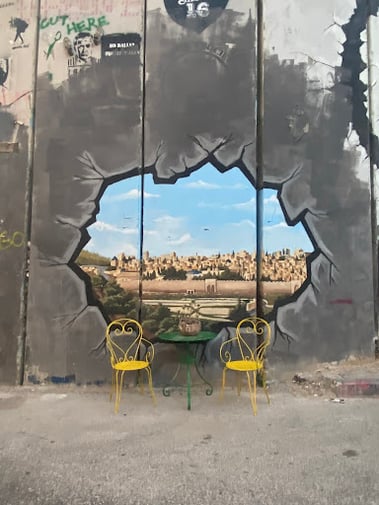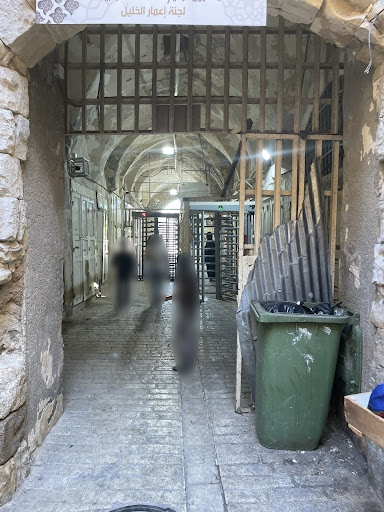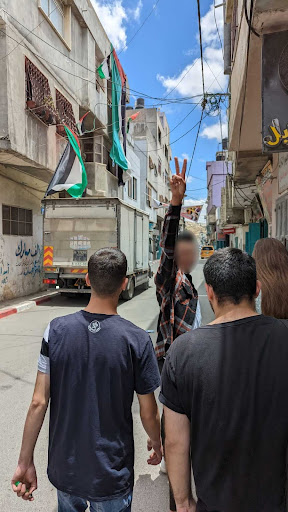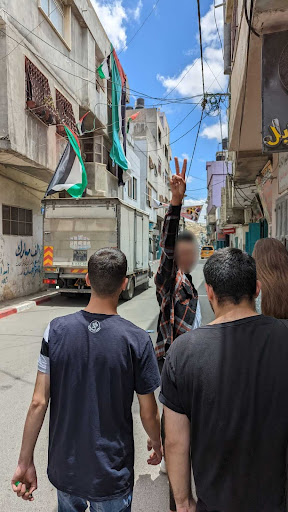Each year, MA in Peace and Justice students complete internships working for organizations in the field of peacebuilding. Students find their own internship placements with local, domestic and international changemaking organizations that align with their academic interests and are best suited for their career goals. This student's internship took them to Hebron, Palestine, a city in the southern West Bank, which they reflect on in this post. They have asked us to keep their identity anonymous due to the sensitive nature of its contents.
As a graduate student of Peace and Justice at the Kroc School of Peace Studies, I study and analyze violence and conflict to theorize the root causes and best resolutions. I have honed theoretical and analytical tools to discern what peace is and is not and how it relates to and reflects perceptions of justice. This past summer, I completed an internship in the occupied West Bank, specifically in the city of Hebron, studying and researching within a human rights and refugee context. Over six weeks, I conducted interviews, shadowed, and sat in meetings with leading civil rights organizations, governmental actors, activists, and representatives in their respective fields. The experience reaffirmed one thing: Palestine is the apartheid capital of the world.
Hebron, where I lived during my internship, is a microcosm of the apartheid seen throughout the West Bank, with instances of apartheid in every aspect of society. For most of us, our knowledge extends to Nelson Mandela and his resistance against South African apartheid. Typically, the word apartheid is not in the consciousness of the everyday American. In the American context, our greatest parallel of understanding apartheid is learning about life under the Jim Crow era following the civil war. Spending a summer in Palestine, interning in the human rights and refugee fields, I got a glimpse of what life is like for Palestinians. At the least, it is apartheid. At worst, it is the most dehumanizing experience imaginable.
 Apartheid wall art in Bethelem
Apartheid wall art in Bethelem
The side effects of their material conditions have trickled down into internal society for Palestinians. One issue within Palestinian society as a side effect of the occupation is mental health, especially those of ex-prisoners. Ex-prisoners include women and children and range from administrative detainees, or those held in prison with no charge or trial, to those who resisted the occupation to secure their right of self-determination and personal safety, granted by international law. These prisoners use their bodies to resist, the last thing they have full agency over, fully extending their right of existence with dignity and humility, which is trying to be stripped away. “They feel they need to be heroes, but heroes also need support," I was told during a visit. They go on hunger strikes, collectively, in solidarity, or individually, to protest their illegal and immoral treatment. They seek resistance in any way imaginable, even if it means breaking the stigma and seeking help from mental health experts. In a way, to be able to take agency against your trauma and heal yourself is fighting against the entity that wants you ethnically cleansed.
This reclamation of agency for resistance extends to many elements of the occupation. It can be as simple as celebrating at every opportunity, or simply practicing happiness, as that is seen as an act of resistance. It can also manifest in more bleak ways. For example, for those who don't know, Israeli universities will hold the bodies of murdered Palestinians in their basement, inside fridges/freezers. They do this for a few reasons: to humiliate and degrade the Palestinians’ religious practices and not allow for proper burial. They do so for necropolitical reasons, using the bodies as political pawns for future negotiations and other means. Another reason is to restrict the murdered Palestinians from becoming martyrs to their families and communities. The culture of martyrdom is seen as resistance because, for an occupation to last 74 years and counting, the only way for it to be dismantled at this point is “a death by 1000 cuts.” For every Palestinian assassinated by the Zionist forces, their death will never be in vain, but instead, one more gash that will lead to liberation. However, holding the bodies in Israeli universities is attempted to be reclaimed by Palestinians through a unique perspective of a decolonial process. Holding these bodies in Israeli universities gives these Palestinians their return to their land, but only through their death - a meek but profound perspective shared with me in an interview. Yet, those who could return in such a way are still under restriction, locked away inside a freezer, remaining imprisoned.
This metaphor highlights an aspect of the Palestinian struggle, through an oxymoron: only getting their rights in death, yet still imprisoned past life.
Despite all they have endured and continue to endure, their ethic of Sumud, or steadfastness, is at their core. Defiantly, the Palestinian people are the most generous, kind, friendly, and hospitable people I have ever met. They are unwavering in their convictions, forever refusing capitulation.
During every sit-down conversation I had with Palestinians regarding their life under occupation, I asked the same thing: "What does 'apartheid' mean to you, and would you consider yourself living under apartheid?" Their answer? Unanimous. "It is not just apartheid, it is worse." What should it be called, then? This exact sentiment is one of the problems: the Western lexicon only reaches as far as the consequential conditions of our colonial and imperialist endeavors. Often referred to as a “conflict”, this term is insufficient and dangerous to repeat as it sanitizes and desensitizes the international community to the disproportionate oppression and egregious crimes committed.
What exactly does "worse than apartheid" mean? Well, it extends beyond just segregation, as some may only understand it. It materializes in “petty" ways, and much more grand forms. From what I witnessed and learned firsthand…
Apartheid is movement control. Having separate IDs, roads, and license plates, a whole apparatus that provides specific displays of identity, to be profiled and restricted solely off of that identity. Palestinians are registered and given ID numbers that document them within the Israeli system to supply the growing database of Palestinians and their friends and family. If you are a diaspora Palestinian, your second citizenship is useless, still subjecting you to oppressive laws and illegal practices. Palestinians visiting their homeland are targeted at the one checkpoint they are allowed to cross, through Jordan, and often detained for hours on end, interrogated, and sometimes illegally denied entrance and deported to a foreign country, sometimes different than the one they came from.
It’s about having the Ibrahimi Mosque, a historically significant mosque, controlled and converted into a half-mosque-half-synagogue. It is the only one of its kind in the world, with a militarized checkpoint controlled by the occupying Israeli government. It is in an area designated to be under the sole control of Palestinians, yet Israel can restrict when the Mosque can be used as a Mosque.
Apartheid is needing to ask permission to go to the third holiest site in Islam, Al-Aqsa Mosque, waiting a year or more to gain such a permit, to then be rejected at the gate on the whim of some 18-year-old soldier on a power trip. Al-Aqsa Mosque is regularly raided by Jewish Zionist extremist settlers, guided and protected by Israeli soldiers, where they desecrate and vandalize the area and mosque and sometimes cause serious injuries or death to worshippers.
Apartheid is being forced off the bus that takes you to Jerusalem to get questioned, only because you are Muslim or Palestinian, separated from those who stay on the bus and get their passports checked by a soldier. It is a Palestinian student needing additional permission to be issued a visa from the Israeli government to travel and study abroad after getting accepted to the school. To even get such approval and visa, they must get a separate permit to even visit the Israeli embassy in Jerusalem; a permit just to apply for another permit, oftentimes being rejected or delayed, and impacting the education and future opportunities that may come from it.
 Security checkpoint to Ibrahimi Mosque, the only Mosque currently functioning as a half synagogue for Zionist settlers.
Security checkpoint to Ibrahimi Mosque, the only Mosque currently functioning as a half synagogue for Zionist settlers.
.jpeg?width=512&height=384&name=maps%20of%20the%20old%20city%20(1).jpeg)
Maps of the Old City area of Hebron (Al Khalil) show the restriction of movement for Palestinians.
.jpeg?width=512&height=384&name=maps%20of%20the%20old%20city%20(2).jpeg)
Apartheid is controlling mail, having packages or letters held for months or even years, with the longest time I have heard of being eight years. Simply having a Palestinian address will cause your mail to be “imprisoned,” reflecting the same oppression Palestinian identity can cause. Apartheid is about seeing the miles and miles of the illegal separation wall, plastered with art of resistance and art showing existence. Apartheid is about having a 4-year degree take upwards of 10 years to complete because of the added stress and possible illegal presence of soldiers coming to arrest and sometimes killing you or your classmates.
Apartheid is water control, denying Palestinians access to water resources and infrastructure that is theirs. “Israel controls and denies Palestinian access to water reservoirs and pumping sites, routinely destroys water wells, and imposes a discriminatory and arbitrary permit regime for the implementation of any water-related project.” Instead, they have water siphoned off to illegal Jewish settlements, with basically unlimited access. “It is estimated that Israeli settlers, illegally residing in the OPT, consume three to eight times more water than the entire Palestinian population of the West Bank, excluding East Jerusalem.” Palestinians have to ration their family's supply, limited to a tank on their roof, sometimes needing to pay exorbitant amounts for additional private tanks. Palestinians receive, on average, 30% less water than what is recommended by the World Health Organization.
Apartheid is more than 12 Palestinians who were killed or died at the hands of the occupation’s forces while I was there during the summer of 2022. 231 Palestinians were murdered in 2022, with 173 in the West Bank alone, making it the deadliest year on record in the West Bank. These deaths were not the result of some equal “two-sided violence”. They were murdered by illegal settlers - or religious extremists, and occupation soldiers - or what many could consider terrorists, who perform raids, mostly at night, trespass, and are guarded, protected, and pardoned of any consequences by the occupation government. Complete impunity, regardless of who you are. For example, Palestinian-American Al-Jazeera journalist Shireen Abu Akleh was assassinated by an Israeli soldier in May with no consequences following a biased investigation that still concluded Israel was “likely responsible.”
Some may say that consensus isn’t met yet, but that is simply not true anymore. 25+ Israel human rights organizations released a joint statement, declaring, "The occupation and apartheid in the oPt (occupied Palestinian territories) have made Jewish supremacy the de facto law of the land, and the new government seeks to adopt this into their official policy." Other international rights organizations, including Human Rights Watch, Amnesty, and even the UN Special Rapporteur to the OPT, have all made similar statements and reports.
With this consensus established, it is long past due for institutions around the world, and especially in the US, to have their actions reflect this consensus and these reports.
Worried about discussing the occupation too often in conversation and coming off insensitive, as if this was something that shouldn't be casually mentioned (or ever really discussed) in public, I asked a 20-year-old what his thoughts were. He said, "it is our life every day, so some people don't like to talk. But for me and many others, we understand that it is important to talk about, to tell the world, and hopefully, by telling you, you can help do that. Tell people about our struggle."
This internship inspired me to continue my activism and advocacy on campus, especially as someone who is non-Palestinian, because it is just as important to be an advocate for someone who you may not know or a group you are not a part of. With this experience, I came back to the US playing an ambassador-style role. Doing just as the 20-year-old Palestinian had asked, I continue to share the stories and what I witnessed with everyone I could, to inform and foster a sense of care in others so they can become advocates and ambassadors themselves. I created a student organization upon my return and crafted a series of programming that touches on educational, cultural, and advocacy-based programming, including a panel discussion with the Human Rights Watch Director of Israel/Palestine and the 2016-2022 UN Special Rapporteur of the Occupied Palestinian Territories, as well as a call to action for university affiliates.
As I make it through the final year of my two-year degree in Peace and Justice at the Kroc School, I reflect on my experience in Palestine. I think about talking to a university student who had a thesis presentation the same day that two of his classmates, also presenting, got arrested for no reason (other than being Palestinian). He asked me about myself, and I told him I was pursuing my master's degree in Peace and Justice. Laughing, he told me, "There is no peace in this world." I also reflect on the words of a psychiatric counselor for ex-prisoners and their families. When a colleague asked, "Do you think things will ever get better?" she responded, "We can't predict the future, but we can help create it.” So I guess that is what my degree really is; a degree that I hope to utilize to be a credible voice, to advocate for, support, and co-create a just future I want to exist in - for those in whom I want their liberation achieved, as they do not see or experience peace, and certainly not justice. At this point, it is a hopeful manifestation, to which we say: insha’Allah.


About the Author






